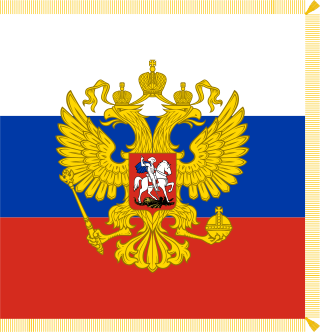
The president of the Russian Federation is the executive head of state of Russia; the president leads the executive branch of the central government of Russia and is the commander-in-chief of the Russian Armed Forces. It is the highest office in Russia.

The chairman of the government of the Russian Federation, also informally known as the prime minister, is the head of government of Russia. Although the post dates back to 1905, its current form was established on 12 December 1993 following the introduction of a new constitution.

The Constitution of the Russian Federation was adopted by national referendum on 12 December 1993. Russia's constitution came into force on 25 December 1993, at the moment of its official publication, and abolished the Soviet system of government. The current Constitution is the second most long-lived in the history of Russia, behind the Constitution of 1936.

Dmitry Anatolyevich Medvedev is a Russian politician who has been serving as the deputy chairman of the Security Council of Russia since 2020. Medvedev also served as the president of Russia between 2008 and 2012 and as the prime minister of Russia between 2012 and 2020.

Presidential elections were held in Russia on 2 March 2008, and resulted in the election of Dmitry Medvedev as the third President of Russia. Medvedev was elected for a four-year term, whose candidacy was supported by incumbent president Vladimir Putin and five political parties, received 71% of the vote, and defeated Gennady Zyuganov of the Communist Party of the Russian Federation, and Vladimir Zhirinovsky of the Liberal Democratic Party of Russia.

The Constitutional Court of the Russian Federation is a high court within the judiciary of Russia which is empowered to rule on whether certain laws or presidential decrees are in fact contrary to the Constitution of Russia. Its objective is only to protect the Constitution and deal with a few kinds of disputes where it has original jurisdiction, whereas the highest court of appeal is the Supreme Court of the Russian Federation.

Dmitry Medvedev's First Cabinet was a cabinet of the government of the Russian Federation following the 2012 Russian presidential election that resulted in the election of Vladimir Putin as the fourth President of Russia.

The presidency of Dmitry Medvedev began on 8 May 2008, when he became the 3rd President of the Russian Federation. Medvedev was the Head of the Presidential Administration during the 2nd term of Vladimir Putin as president, and the Chairman of Gazprom oil company. Dmitry Medvedev was the youngest Russian leader since 1918, during his inauguration. Medvedev's main domestic agenda has been the wide-ranging Medvedev modernisation programme which aims at modernising Russia's economy and society. In particular, the massive Skolkovo innovation center, part of the modernisation programme, is often regarded as Medvedev's brainchild. Another important program has been the Russian police reform, launched by Medvedev in 2009, and led to the renaming of the Policing Organisation from Militsiya to police. In foreign policy, Medvedev assumed a more conciliatory tone than his predecessor, pursuing a closer relationship with the United States in general and with President Barack Obama in particular; The New START nuclear arms reduction treaty is regarded as Medvedev's main achievement in foreign affairs. Under Medvedev, Russia intervened on behalf of South Ossetia and Abkhazia after a Georgian military attack against the de facto independent regions, and emerged victorious in the ensuing five-day 2008 South Ossetia war. During Medvedev's tenure, Russia also struggled with and recovered from the serious late 2000s financial crisis. Other important decisions made by Medvedev include lowering the Duma election threshold from 7% to 5%, firing Moscow's powerful but criticised mayor Yuri Luzhkov, launching a large-scale privatisation of state-owned companies, removing state officials from the boards of state-owned companies and the extension of the Presidential term from four years to six.
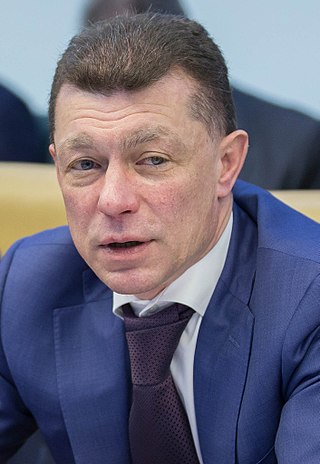
Maxim Anatolyevich Topilin is a Russian economist. He has the federal state civilian service rank of 1st class Active State Councillor of the Russian Federation.
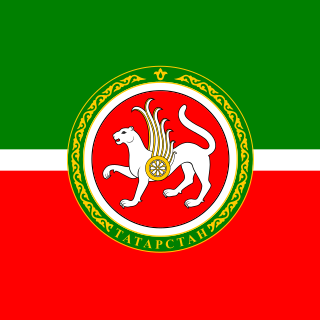
The Head (Rais) of the Republic of Tatarstan, formerly known as the President of the Republic of Tatarstan (1991–2023), is the head of the republic and the highest-ranking official of Tatarstan, a federal subject of Russia. The office was established in 1991.
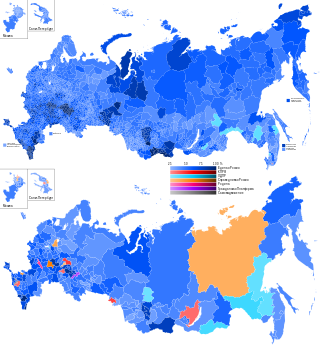
Legislative elections were held in Russia on 18 September 2016, having been brought forward from 4 December. At stake were the 450 seats in the State Duma of the 7th convocation, the lower house of the Federal Assembly. Prior to the election United Russia had been the ruling party since winning the 2011 elections with 49.32% of the vote, and taking 238 seats (53%) of the seats in the State Duma.

The State Duma of the Federal Assembly of the Russian Federation of the 6th convocation is a former convocation of the legislative branch of the State Duma, Lower House of the Russian Parliament. The 6th convocation meets at the State Duma building in Moscow, having begun its term on December 21, 2011 following the last session of the 5th State Duma. The term of office expired October 5, 2016, when the next parliamentary elections.

The State Duma of the Federal Assembly of the Russian Federation of the 5th convocation is a former convocation of the legislative branch of the State Duma, lower house of the Russian Parliament. The 5th convocation met at the State Duma building in Moscow, worked from December 24, 2007 to December 21, 2011.
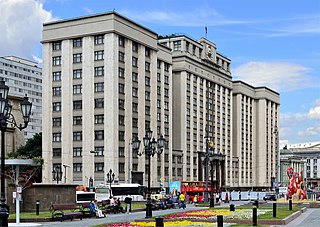
The State Duma of the Federal Assembly of the Russian Federation of the 7th convocation is a former convocation of the lower house of Russian parliament.
Presidential elections are scheduled to be held in Russia in March 2024. In accordance with electoral law, the first round will be held on Sunday, 17 March. If no candidate receives more than half the vote, a second round will take place exactly three weeks later on 7 April 2024. The winner of the election is scheduled to be inaugurated on 7 May 2024.

Dmitry Medvedev's Second Cabinet was the composition of the Russian government from 18 May 2018 to 15 January 2020 under the leadership of Prime Minister Dmitry Medvedev.

The Mikhail Mishustin Cabinet is the federal government of Russia, formed in 2020, led by Prime Minister Mikhail Mishustin. It succeeded the previous one led by Dmitry Medvedev.

A constitutional referendum was held in Russia between 25 June and 1 July 2020. President Vladimir Putin proposed the referendum during his address to the Federal Assembly on 15 January 2020. The draft amendments to the constitution were submitted to a referendum in accordance with article 2 of the Law on Amendments to the Constitution. The referendum is legally referred to as an "All-Russian vote", for it is not held in accordance with the Federal Constitutional Law on the Referendum.
The amendments of 2020, which were proposed in January 2020, are the second substantial amendments to the Constitution of Russia of 1993. To introduce these amendments, Vladimir Putin, president of Russia, held a national vote. They were approved on 1 July by a popular vote.

The State Duma of the Federal Assembly of the Russian Federation of the 8th convocation is the current convocation of the lower house of Russian parliament.



















